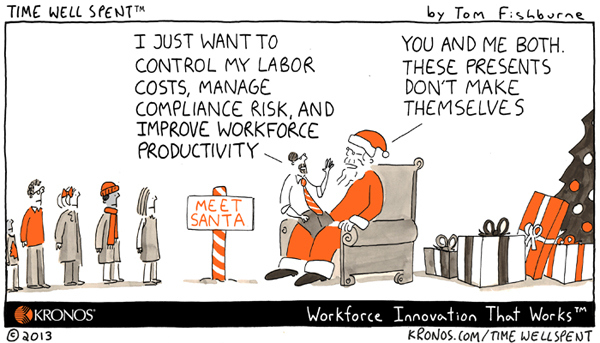Editor’s note: This is the final Weekly Wrap of 2013. We’ll return in January 2014 with more weekly HR news and trends.
It’s a question I hear people ask a lot, but I never seem to get a very good answer.
You’ve probably heard it before, too — “What Keeps HR Up at Night?”
Well, SilkRoad, a technology company that describes itself as “a leading global provider of cloud-based, end-to-end HR solutions,” asked that same question of 853 managers and executives in the HR and talent management space, and they got some interesting responses.
HR’s top concerns
For example:
- Biggest concerns — HR professionals are most concerned with engaging and retaining employees (48 percent), developing leaders and managing skills gaps (45 percent), and recruiting the best employees (41 percent).
- HR’s business function — More than half (53 percent) of HR professionals were most concerned with developing an HR organization that acts strategically rather than tactically. Ensuring that HR has a “seat at the table” in making business decisions (41 percent) and managing organizational change (41 percent) were the other top concerns for the business function.
- Recruiting and retention – When it came to recruiting concerns, the majority (53 percent) selected creating an attractive organizational culture to engage employees and 51 percent chose sourcing the right candidates for the company
- Millennial talent – When asked whether they were concerned about attracting top Millennial talent as Baby Boomers retire, 56 percent were either very concerned or concerned.
- Succession planning – Only 38 percent of respondents felt they would be prepared if faced with the sudden retirement of a top executive; 62 percent either would not be prepared or didn’t know.
- Compliance – Almost two-thirds of respondents were concerned about staying current with evolving laws and regulations (63 percent). Some 47 percent identified ensuring employees have appropriate training to avert lawsuits and risks, and 47 percent chose having data readily available for compliance reporting as other top concerns.
“HR leaders are voicing perennial concerns”
Although the SilkRoad report was a little light on insight and analysis, the conclusion of the survey summary did say this:
Corporate downsizings, mergers, and acquisitions of the past few years have no doubt changed the way that talent is managed. Findings indicate that HR professionals are seriously concerned about sourcing, recruitment, retention, developing leadership, and managing skills gaps. The transformation of the workforce in the past few years has put greater pressure on the HR function to think and act strategically.
Yet, survey results indicate that HR leaders are voicing perennial concerns about developing a strategic role within their companies. This entails not just focusing on HR departmental issues, but on the challenges facing the business as a whole — helping to develop a workforce that will create value for the organization.”
That bit about HR leaders “voicing perennial concerns” is a good point to keep in mind, because none of these concerns expressed by HR pros in this survey are really new, but they are evolving.
Yes, the push for a “seat at the table” is still in there, but that issue seems to be waning. Other issues — like the push to act more strategically — seem to be growing after years of people talking about them.
So, you should take a good look at SilkRoad’s “What Keeps HR Up at Night?” if you are interested in where the human resources profession is heading in 2014. If nothing else, it will give you something to benchmark your own goals and concerns against moving ahead.
That’s always a good way to head into the New Year.
Why you need to hire people better than you
Of course, there’s more than what is keeping HR up at night in the news this week. Here are some HR and workplace-related items you may have missed. This is TLNT’s weekly round-up of news, trends, and insights from the world of talent management. I do it so you don’t have to.
- Businesses without managers? Why is this bad trend still around? I’ve written before that the notion that a business or organization can get along without managers is just nutty — yes, somebody needs to be in charge and make decisions — but every so often another company pops up that says they have figured out how to make it work. Take a look at what Medium is doing and see what you think. Somehow, this doesn’t seem like a good or productive way to run a business.
- Why you need to hire people better than you. For years I have heard people make the case that you always need to hire people who are better than you, but rarely have I seen that case for doing so articulated as well as it is in this recent New York Times story. As the co-chairman of EF Education First tells the Times, “If you hire great people, all other problems disappear. Unfortunately, a lot of people feel a bit threatened by people who are better. That’s why we always say that no one ever lost their job because they’ve hired someone who was too good. But the reverse has happened throughout history.”
- Performance reviews don’t have to be awful. Most everybody I know seems to hate performance reviews, but according to this Fast Company story, that doesn’t have to be the case. “It’s not that the annual performance review is going to cripple every company; only if they’re terrible. It’s a matter of the contents, context, and subsequent incentives of the review, as No Asshole Rule author and managerial connoisseur Bob Sutton contends. So allow us to review how performance reviews go wrong.”
- Unions need to give the public a break. Longtime Los Angeles Times political columnist George Skeltonlooks at recent polling that shows that unions — particularly public employee unions — are falling into disfavor with the public in deep blue, union-loving California.He makes this very pragmatic point: “When Californians turn against organized labor, that should be a clue for unions and their pet politicians to ease up on taxpayers and transit riders.”
- Kronos Time Well Spent cartoon. Kronos, the company that probably makes your organization’s time-and-attendance systems, publishes a regular Time Well Spent workplace cartoon by Tom Fishburne. I post them here from time to time in the Weekly Wrap.

